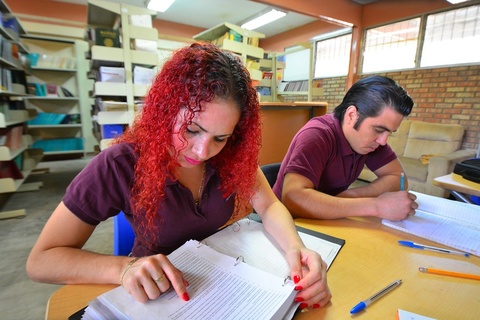
This spring, we're featuring a few of our newer Working Groups. As one of the most popular and largest Obermann Center programs, the Working Groups span a wide range of topics and have members who include emeriti faculty, lecturers, community members, and students, in addition to faculty from both the University of Iowa and other institutions. Here, we speak with Christine Shea (Spanish & Portuguese), who co-directs the Spanish Heritage Speakers in the Classroom Working Group with Becky Gonzalez (Spanish & Portuguese).
Q: This is the first year of your Working Group. What led you to start it?
CS: We wanted to pull together people in the Spanish and Portuguese program who work on issues related to Spanish heritage speakers from multiple perspectives and also provide a space to talk about what each of us is doing. We thought that an Obermann Working Group would be perfect for that purpose because it provides an umbrella of resources as well as an official name that we can draw upon for recognition. Basically, we wanted to create a space for those of us in the Department who have common interests in Spanish heritage speakers to interact and share ideas.
Q: What kinds of people from what disciplines are participating in your group?
CS: We have instructional-track faculty who teach classes directly focused on heritage speakers, tenured and tenure-track faculty who teach classes on multilingualism and language acquisition, and a graduate student (MA, Spanish and Portuguese) who is planning on continuing to a PhD focused on heritage speaker linguistic identity.
Q: What is the current focus of your work together? If there is something you're reading (or listening to or watching) together, please share that.
CS: We meet every month to discuss ideas about how best to promote awareness of the heritage speaker classes offered in our department—and, more generally, to promote awareness of heritage speaker bilingualism and biculturalism here at the University and in Iowa.
Q: What excites you about this topic and the possibility for either future research or campus change?
CS: What excites us is the possibility of broadening the conversation around the presence of Latinos in Iowa and here at the UI and the connection between language (regardless of proficiency), identity, and multilingualism more broadly. As well, we would like to deepen and expand the conversation with others at the university regarding what it means to be bilingual. There is a famous saying—"bilinguals are not two monolinguals in one"—that is particularly applicable to this notion.
Q: Please suggest one thing—an article, a podcast, an organization—that someone less familiar with this topic might look at to better understand the issues of interest to your group.
CS: Hmmmm....It is a bit challenging because the term "heritage language speaker" is not familiar to all people. But here is a paper: Leeman, J. (2018). "Critical language awareness and Spanish as a heritage language: Challenging the linguistic subordination of US Latinxs." The Routledge handbook of Spanish as a heritage language (pp. 345–358).
The group is sponsoring Dr. Julio Torres, University of California–Irvine, for two upcoming events:
- Friday, April 1, 2022: Heritage Language Education: A Talk by Dr. Julio Torres
- Saturday, April 2, 2022: Tasks in Action! — A Workshop by Dr. Julio Torres
Both virtual events are free and open to the public; registration is required.